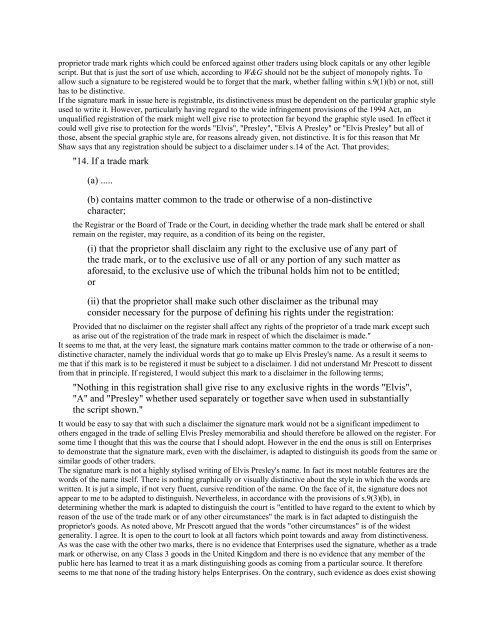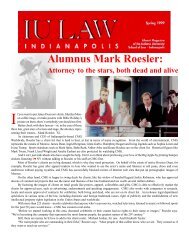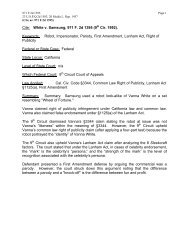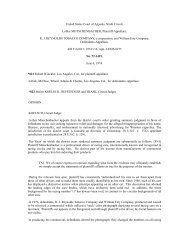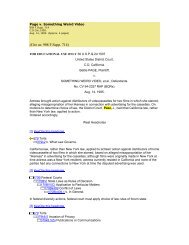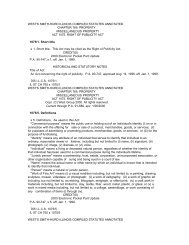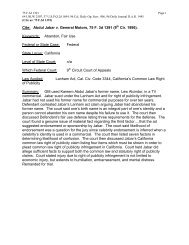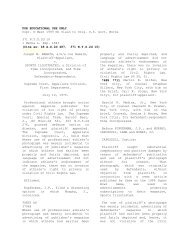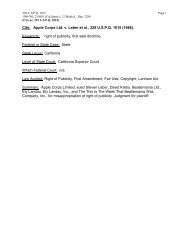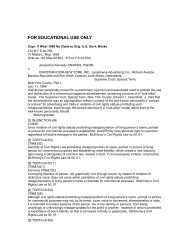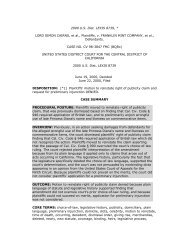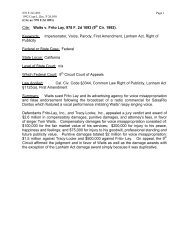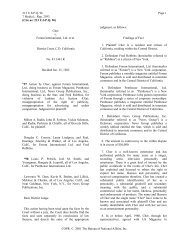Elvisly Yours v. Elvis Presley Enterprises Inc. - Mark Roesler
Elvisly Yours v. Elvis Presley Enterprises Inc. - Mark Roesler
Elvisly Yours v. Elvis Presley Enterprises Inc. - Mark Roesler
Create successful ePaper yourself
Turn your PDF publications into a flip-book with our unique Google optimized e-Paper software.
proprietor trade mark rights which could be enforced against other traders using block capitals or any other legiblescript. But that is just the sort of use which, according to W&G should not be the subject of monopoly rights. Toallow such a signature to be registered would be to forget that the mark, whether falling within s.9(1)(b) or not, stillhas to be distinctive.If the signature mark in issue here is registrable, its distinctiveness must be dependent on the particular graphic styleused to write it. However, particularly having regard to the wide infringement provisions of the 1994 Act, anunqualified registration of the mark might well give rise to protection far beyond the graphic style used. In effect itcould well give rise to protection for the words "<strong>Elvis</strong>", "<strong>Presley</strong>", "<strong>Elvis</strong> A <strong>Presley</strong>" or "<strong>Elvis</strong> <strong>Presley</strong>" but all ofthose, absent the special graphic style are, for reasons already given, not distinctive. It is for this reason that MrShaw says that any registration should be subject to a disclaimer under s.14 of the Act. That provides;"14. If a trade mark(a) .....(b) contains matter common to the trade or otherwise of a non-distinctivecharacter;the Registrar or the Board of Trade or the Court, in deciding whether the trade mark shall be entered or shallremain on the register, may require, as a condition of its being on the register,(i) that the proprietor shall disclaim any right to the exclusive use of any part ofthe trade mark, or to the exclusive use of all or any portion of any such matter asaforesaid, to the exclusive use of which the tribunal holds him not to be entitled;or(ii) that the proprietor shall make such other disclaimer as the tribunal mayconsider necessary for the purpose of defining his rights under the registration:Provided that no disclaimer on the register shall affect any rights of the proprietor of a trade mark except suchas arise out of the registration of the trade mark in respect of which the disclaimer is made."It seems to me that, at the very least, the signature mark contains matter common to the trade or otherwise of a nondistinctivecharacter, namely the individual words that go to make up <strong>Elvis</strong> <strong>Presley</strong>'s name. As a result it seems tome that if this mark is to be registered it must be subject to a disclaimer. I did not understand Mr Prescott to dissentfrom that in principle. If registered, I would subject this mark to a disclaimer in the following terms;"Nothing in this registration shall give rise to any exclusive rights in the words "<strong>Elvis</strong>","A" and "<strong>Presley</strong>" whether used separately or together save when used in substantiallythe script shown."It would be easy to say that with such a disclaimer the signature mark would not be a significant impediment toothers engaged in the trade of selling <strong>Elvis</strong> <strong>Presley</strong> memorabilia and should therefore be allowed on the register. Forsome time I thought that this was the course that I should adopt. However in the end the onus is still on <strong>Enterprises</strong>to demonstrate that the signature mark, even with the disclaimer, is adapted to distinguish its goods from the same orsimilar goods of other traders.The signature mark is not a highly stylised writing of <strong>Elvis</strong> <strong>Presley</strong>'s name. In fact its most notable features are thewords of the name itself. There is nothing graphically or visually distinctive about the style in which the words arewritten. It is jut a simple, if not very fluent, cursive rendition of the name. On the face of it, the signature does notappear to me to be adapted to distinguish. Nevertheless, in accordance with the provisions of s.9(3)(b), indetermining whether the mark is adapted to distinguish the court is "entitled to have regard to the extent to which byreason of the use of the trade mark or of any other circumstances" the mark is in fact adapted to distinguish theproprietor's goods. As noted above, Mr Prescott argued that the words "other circumstances" is of the widestgenerality. I agree. It is open to the court to look at all factors which point towards and away from distinctiveness.As was the case with the other two marks, there is no evidence that <strong>Enterprises</strong> used the signature, whether as a trademark or otherwise, on any Class 3 goods in the United Kingdom and there is no evidence that any member of thepublic here has learned to treat it as a mark distinguishing goods as coming from a particular source. It thereforeseems to me that none of the trading history helps <strong>Enterprises</strong>. On the contrary, such evidence as does exist showing


